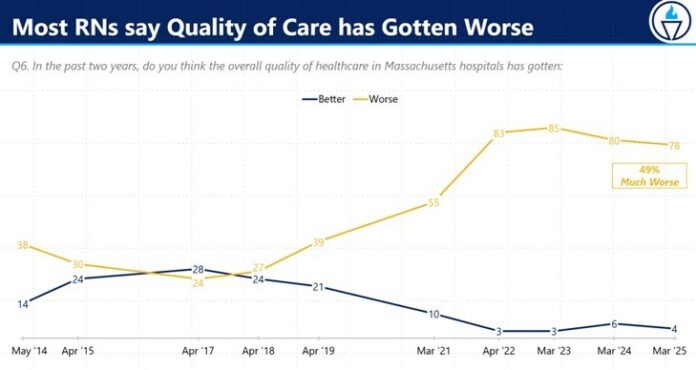Canton, MA — The latest State of Nursing in Massachusetts survey reveals a worsening crisis in hospital care, with registered nurses across the state reporting deteriorating patient conditions, unsafe staffing levels, and a sharp rise in workplace violence. Released by the Massachusetts Nurses Association (MNA) to mark National Nurses Day, the 2025 report reflects growing concern among front-line healthcare professionals and highlights their calls for urgent legislative action.
The survey, conducted by Beacon Research and based on responses from over 500 registered nurses—primarily non-union—paints a stark picture of life inside the state’s hospitals. Nearly 80% of nurses say the quality of hospital care has declined over the past two years, with half reporting that conditions have become “much worse.” This marks a persistent decline that began during the pandemic and has yet to recover to pre-COVID levels.
Nurses cite a range of compounding challenges, including chronic understaffing, reduced support staff, limited bed availability, and difficulty discharging patients. Two-thirds of respondents say they no longer have adequate time to provide patients with the care and attention they need. Alarmingly, nearly 40% of nurses say they would not feel safe admitting a family member to their own unit.
“Our hospitals are still in crisis, and nurses are being pushed beyond their limits,” said MNA President and ICU nurse Katie Murphy. “Staffing shortages, increasing violence, and lack of resources are threatening both patient safety and the future of the nursing profession. These are not just workplace concerns—they are urgent public health issues.”
Workplace violence remains a growing concern, with 47% of nurses reporting abuse or threats on the job, a 10-point jump from last year. Other worsening conditions include inadequate insurance coverage for patients, lack of sufficient beds, and staffing cuts among ancillary support workers. Many nurses also expressed fear that unsafe conditions could put their professional licenses at risk.
The strain on staffing is contributing to direct consequences for patients. Eighty-three percent of nurses said they had witnessed patients go without necessary care due to short staffing. Three out of four reported not having enough time to properly educate patients or provide safe discharge planning. Nearly 70% noted an increase in complications and patient readmissions, while over half were aware of medical errors linked to insufficient staffing. One in four nurses reported observing patient deaths they believed were caused by unsafe nurse-to-patient ratios.
Despite broad consensus among nurses for legislative solutions—such as patient limits to ensure safer staffing—state leaders and hospital executives have yet to act decisively. The MNA is sharing these findings with the Massachusetts Legislature as it considers policy options to address the deepening crisis.
“Nurses are organizing, advocating, and calling for change,” Murphy said. “We have identified solutions, and now we need action from those in power to protect patients and preserve the profession.”
A virtual briefing titled Voices from the Frontlines: The State of Nursing and Patient Care in Massachusetts will be held on May 6 to further discuss the survey’s findings and recommendations.


